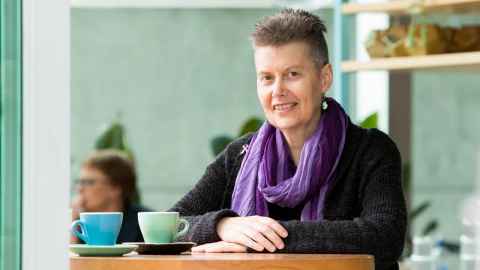Global Studies director on personal push to Pharmac
7 March 2019
University of Auckland academic Dr Hilary Chung, who has terminal cancer, heads to Parliament on 13 March to ask the Health Select Committee to fund two life-lengthening drugs for women with metastatic breast cancer.

Dr Hilary Chung is the founding director of the University’s popular Global Studies Programme and has metastatic disease. Her breast cancer – first diagnosed in 2015 and treated – returned last year and has spread through her body.
She knows it’s terminal but she’s undergoing treatment with the drug Palbociclib – known as Ibrance – a drug that prolongs life but isn’t funded in New Zealand by Pharmac.
“If you want to turn the spotlight on me, I feel incredibly uncomfortable doing it, but I’m doing it for the sake of everybody else,” says Dr Chung.
Maybe the reason the funding’s not been considered important enough before, is because it’s a bunch of women who are going to die anyway.
When she heads to Wellington she’ll ask the Minister of Health and Pharmac to fund two drugs – Kadcyla and Palbociclib – for metastatic breast cancer sufferers.
“Many women who have metastatic disease have to stop work and they want to be with their kids while they still can,” says Dr Chung. “Any extra time they might gain, it’s not valueless, it’s utterly valuable.
“Maybe the reason the funding’s not been considered important enough before, is because it’s a bunch of women who are going to die anyway. What is overlooked in all that, is the contribution these women who are dying still make every day.
“You don’t have to be me to be someone who contributes … you can be making the school lunches or helping with the school gala.
“This is one thing I can do for my sisters. I’m a lecturer – I stand in front of big rooms full of people all the time. So for me it’s not scary. I can do this.”
When she was diagnosed with metastatic disease, her boss, the Dean of Arts, Professor Robert Greenberg, insisted she set up a Give-a-Little page to raise funds to be treated with Ibrance.
“The Dean has been so supportive,” says Dr Chung. “I owe a lot to him. “I feel so grateful. When the fundraising first started I was so overwhelmed I didn’t know what to do. I was so emotional ... people had given me so much money. If I keep thinking about it I’ll burst into tears right now.
“I also get lots of small donations from poor students and it breaks my heart, their kindness.”
Meeting Dr Chung, you wouldn’t know she was sick. She cycles to and from her Avondale home to the City Campus for work, is an enthusiastic stand-up paddleboarder, a vegetarian and is very fit.
“I know right, look at me! But if you look at my scan … well it’s everywhere. It’s right through my body. In all my bones. Scapula, clavicle, down my spine, my hips, pelvis. And in my liver. I went for my first CT scan looking like this [in cycling gear] and the guy couldn’t believe it. He said ‘someone with a scan like you should be looking poorly’.
“But I’m feeling good because I keep fit. I’m totally reconciled to this. I don’t cry myself to sleep because that would be stupid. My whole attitude to life has changed for sure but I’m so glad I’m still working.”
However she’s finding it tough to reconcile the fact that because of the donations, she can afford treatment.
“It’s not fair. The reason I say it’s not fair is because the only people who will be able to succeed through that route will be people like me who are resourceful and resilient enough to be able to do it. I had huge numbers of contacts to send the page to. I’m lucky.”
In Wellington, Dr Chung won’t shy from telling her story on what it’s like to have metastatic disease. She says a personal submission needs to hit home.
“I want to go there and say ‘mate, let’s get one thing clear. I’m speaking on my own behalf. I will tell you what it feels like. On the days when it’s horrible, it’s a dark, dark place. I’ve learned to get out of those places.
“But having terminal cancer means you walk into your living room and you find your partner sobbing uncontrollably and there’s nothing you can do about it.
“Then you get punched in the stomach when they say you can’t have the drug. Even though if I was in the US, Canada, Australia or the UK I would have access to it.”
She’s full-steam ahead as the 2019 Global Studies programme kicks off – numbers have more than trebled on its inaugural year – and has been interviewing staff to teach on the programme.
“Because, get real, I’m not going to be here for very much longer. I don’t know how long. If this drug works, a bit longer than I would have otherwise but I don’t know when.
“The big thing for me is, I’m having the time of my life. Everything I wanted to do is happening. I’m not going to be able to do it for much longer but I don’t think about that.
“Physical and mental strength can help you stay alive, if you really want to stay alive badly enough. I really want to. Just because I like what I do. I’m kick-ass resilient but I can’t do what I do without fabulous support.”
Republished from UniNEWS Issue 1, March 2019 (PDF 3.99MB).
Denise Montgomery | Publications editor
DDI 923 6061
Email denise.montgomery@auckland.ac.nz